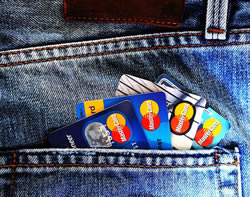Jackie Lam* says there are five things she wishes she could tell her 20-year-old self about managing a credit card.

Photo: The Digital Way
I remember the day I received my first credit card.
It was my third year of university, and I received a thick, white envelope in the mail.
I had opened my first bank account at a local credit union when I was 16, learned to create a basic spreadsheet, and this was the next big step to adulting.
It turned out I had a lot to learn about how credit cards worked.
Looking back, here are five things I wish I could have told my 20-year-old self about credit cards:
- Don’t judge a card based solely on its shiny cover
Embarrassing but true: I decided on my first credit card partly based on the design.
It was a Visa card that was partnered with Disney.
It had an adorable image from the Disney Bambi film.
It even featured the option to redeem points at Disneyland, Disney resorts, and the Disney Store.
Perfect for a then-Disneyphile such as myself.
I was sold.
While there’s nothing wrong with enjoying a card that’s pleasing to the eye, I neglected to check the fine print.
- Don’t pick a card based on the reward points
While rewards are certainly an appealing part of any credit card, I overlooked what was most important to my finances: the annual percentage rate (APR), fees, and any other valuable perks.
I picked it partly because it touted card member rewards to spend at the Disney resorts and at the Disney Store … but then I didn’t go to Disneyland as much as I thought I would.
- Check and understand the APR
The only debt I was carrying at the time was my student loans.
As this was my first experience with revolving credit, I had a small inkling how APR worked.
I knew that credit cards carried interest fees, but exactly how they were calculated?
I didn’t have a single clue.
Looking back, I wish I knew the basics: The APR is, in a nutshell, the cost of borrowing money.
While it’s an annual rate, you can check your credit card statement to see how much you’ll be paying in interest fees each monthly payment cycle.
I’ve never been a big spender, knew to pay off my balance in full each month, and typically only used it to pay for petrol in my car, but because I was so clueless about how interest fees worked, I could have put myself in financial hot water.
- Check the fees
Beyond the interest fees, I didn’t bother to check fees.
Another major fail.
I had no clue what I would be charged if I was late making my minimum payments, and if my charges exceeded the limit on a card.
I also didn’t know what a foreign transaction fee was, let alone what it would cost me if I made any transactions on my card in another country.
I also wasn’t aware of cash advance fees.
Thankfully, I didn’t think of drawing cash from an ATM using my credit card.
However, I wasn’t totally naive to fees.
I do recall knowing that there was no annual fee.
And as I was a broke university student at the time, all the more reason to choose a card without a yearly fee.
- Practise good habits
These days I make sure to monitor my credit score, and order a credit report at least once a year.
While my frugal nature and solid practice of paying my credit cards in full — I have yet to carry a balance on a credit card — spared me from paying loads in interest, I certainly wish I had known to comb over the important details of any credit card offer.
What I didn’t know could have done serious damage to my finances.
* Jackie Lam is a personal finance writer based in Los Angeles, USA.
This article first appeared at www.businessinsider.com.au.






